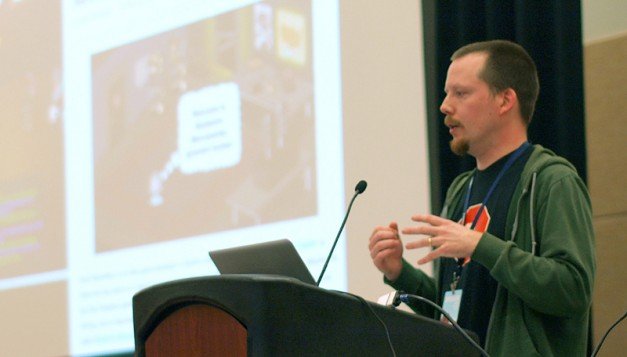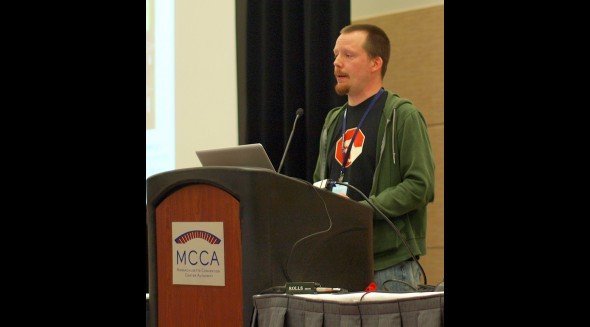
At the “Death of an Indie Studio” PAX East panel earlier this month, developer Scott Macmillan offered a reality-check to the dream of indie success. For an hour, he autopsied his defunct studio, Macguffin Games. “Part of why I want to do this talk is because if those lessons don't circulate around a bit and become useful to people, then I failed in some way. Besides the obvious way that I failed.”
[View the slides here as you read along, for maximum paneling. -Ed. ]
Macmillan quit his job at Boston-area developer Blue Fang Games to start his own company. Then, as he put it, “I ran Macguffin Games into the ground for about three years. We ended up getting two titles out. One in beta state, and the other--in beta state.”
From the start, being a work-from-home independent developer posed problems he never expected.
“I was going absolutely crazy. I was sitting at home most days, and I was coding, and it was slowly driving me nuts. I knew I needed to get out of the house while working. I tried our cafe down the street, I also tried our library, but neither of those gave me what I think now I was missing, which was social interaction in a work environment.” He joined Betahouse, a workspace co-op for entrepreneurs and independent workers in Cambridge. “It got me out of my house, it made sure I had to, say, put pants on in the morning. Which, when you don't put pants on for a month, you don't work as efficiently. I feel any sort of lower-clothing is helpful to getting in a work frame-of-mind.”
Macmillan would often refuse to commit to development decisions, in large part from a lack of urgency. One of his collaborators would tell him, “Dude. We talked about [this] last week, and we talked about [it] the week before. And now we're going to have a third conversation. After which, I am going to throw you through that window.” The delays cost them. Macguffin did not have time to complete their game, All Heroes Die. Their second project, a Facebook game called Mustache Mercenaries, was supposed to be the fast, money-making project that could keep the company afloat, but they were out of money and time. A last-ditch Kickstarter fundraising effort came up well short. Nobody seemed to care, in large part because of two other mistakes Macmillan made.

Macmillan didn't appreciate or understand marketing, and he also didn't understand his target market. “There is a fundamental disconnect for us, as creative people,” he said. “We have been living, breathing, and sweating our own game for ages, and we've been loving it, and telling people about it until they're sick of it. We love our game. Nobody else loves our game. That's the thing that you need to know, and if you realize that, then you may be motivated to learn marketing.”
The biggest gaming news, reviews and hardware deals
Keep up to date with the most important stories and the best deals, as picked by the PC Gamer team.
Macmillan came away with two over-arching points for aspiring indies. The first is that “Time is Money, and Money is Time.” It's a cliché that developers need to internalize and understand, he explained.
“You have a very finite bucket of money, and you can spend that to improve your chances of finishing that game [before funds run out]. And you have to choose how to do that. You can, say, spend some money to hire a sound designer. And then you don't have to do that sound, because guess what? Actually, it did cost you time to make those sounds. And if you don't have time, then you can throw money at it. If you can't throw money at it, and you don't have time, then you just can't get it done.”
The second key point Macmillan made was that art is not business, but a lot of indies aspiring to the former force themselves into the latter. “Those are two different things that you may not be thinking enough about putting together,” he said.
“I'm not trying to discourage people from chasing their dream, what I actually want is to make sure people have better info at the start, to decide what dream they want to pursue.”
He explained, “We don't necessarily need to start a company to fulfill our aims in making games. There are a lot of us who want to make a game, not even make lots of games, it's just that there's a game that you love the idea of and you want to make. And in that case, you should think really hard about the idea of, 'Do I want to start a company about this?' I would say, first, start making the game.”

